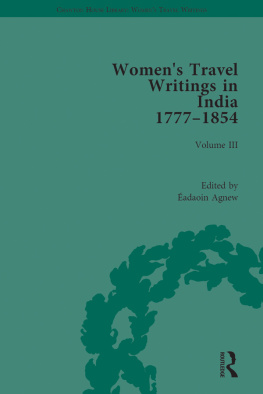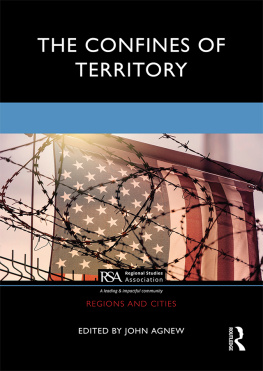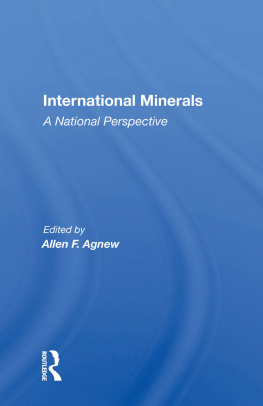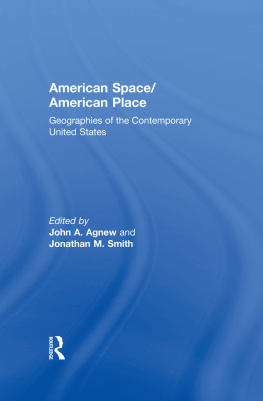ROUTLEDGE LIBRARY EDITIONS: POLITICAL GEOGRAPHY
Volume 1
PLACE AND POLITICS
PLACE AND POLITICS
The Geographical Mediation of State and Society
JOHN A. AGNEW
First published in 1987
This edition first published in 2015
by Routledge
2 Park Square, Milton Park, Abingdon, Oxon, OX14 4RN
and by Routledge
711 Third Avenue, New York, NY 10017
Routledge is an imprint of the Taylor & Francis Group, an informa business
1987 John A. Agnew
All rights reserved. No part of this book may be reprinted or reproduced or utilised in any form or by any electronic, mechanical, or other means, now known or hereafter invented, including photocopying and recording, or in any information storage or retrieval system, without permission in writing from the publishers.
Trademark notice: Product or corporate names may be trademarks or registered trademarks, and are used only for identification and explanation without intent to infringe.
British Library Cataloguing in Publication Data
A catalogue record for this book is available from the British Library
ISBN: 978-1-138-80830-0 (Set)
eISBN: 978-1-315-74725-5 (Set)
ISBN: 978-1-138-79865-6 (Volume 1)
eISBN: 978-1-315-75658-5 (Volume 1)
Publishers Note
The publisher has gone to great lengths to ensure the quality of this reprint but points out that some imperfections in the original copies may be apparent.
Disclaimer
The publisher has made every effort to trace copyright holders and would welcome correspondence from those they have been unable to trace.
PLACE AND POLITICS
The Geographical Mediation of State and Society
JOHN A. AGNEW
John A. Agnew, 1987
This book is copyright under the Berne Convention. No
reproduction without permission. All rights reserved.
Allen & Unwin, Inc.,
8 Winchester Place, Winchester, Mass. 01890, USA
the US company of
Unwin Hyman Ltd
PO Box 18, Park Lane, Hemel Hempstead, Herts HP2 4TE, UK
40 Museum Street, London WC1A 1LU, UK
37/39 Queen Elizabeth Street, London SE1 2QB, UK
Allen & Unwin (Australia) Ltd,
8 Napier Street, North Sydney, NSW 2060, Australia
Allen & Unwin (New Zealand) Ltd in association with the
Port Nicholson Press Ltd,
60 Cambridge Terrace, Wellington, New Zealand
First published in 1987
Library of Congress Cataloging in Publication Data
Agnew, John A.
Place and politics
Bibliography= P.
Includes index.
1. Political Sociology. 2. Geography, Political. 3. Scotland--Politics and Government. 4. United States--Politics and Government. I. Title
JA76.A36 1987 306.2 86-32097
ISBN 0-04-320177-6 (alk. paper)
British Library Cataloguing in Publication Data
Agnew, John A.
Place and politics: the geographical mediation of state and society.
1. Geography, Political
I. Title
320.12 JC319
ISBN 0-04-320177-6
Typeset in 10 on 12 point Bembo by
Computape (Pickering) Limited, North Yorkshire
and printed in Great Britain by Mackays of Chatham
All politics is local
Thomas P. Tip ONeill
Speaker, US House of Representatives (1984)
We speak a different language and here
our tongue is incomprehensible
Carlo Levi, Christ Stopped at Eboli (1947)
Signs and the signs of signs are used
only when we are lacking things
Umberto Eco, The Name of the Rose (1983)
Pistoia and Lucca are two cities in central Italy that are not very far apart, about forty-three kilometers, but have completely different political profiles. Pistoia is and has been for many years a stronghold of the Italian Communist party, Lucca is a Christian Democratic city in a region in which the party of that name is a minority one. Outwardly the two cities are very much alike for example, they have similar demographic and social characteristics. But their histories as places have been quite different. In the case of Pistoia the city has long been controlled from outside, principally from Florence, and the surrounding countryside is characterized by an intense anti-clericalism that survives from the time when the Church was the major local landowner. In the case of Lucca, the city was the seat of a long independent city-republic that persisted until the late eighteenth century and a countryside in which peasant proprietorship was long established. Political life in these two cities, therefore, can only be understood by reference to their development as places. The central theme of this book is that this is equally the case elsewhere.
But a major contention of modern social science is that time conquers space or that, as history proceeds, differences between places become less and less relevant to social life and hence should have less and less of a role in social theory. This book disputes this contention in the context of one important aspect of social life: political behavior.
The frontispiece quotations capture metaphorically the three major contentions of the book: first, that political activity is structured and realized through place-specific social processes (ONeill); secondly, that social science in general and political sociology in particular have not paid sufficient attention to this (Levi); preferring instead, thirdly, to organize explanations of political activity entirely through the inferred political dispositions of social categories (or individuals as members of them) rather than the causes of political activities in places (Eco). To the extent that a geographical concept of place has survived in recent social science, it is in terms of the geographical impacts of social processes operating through social categories. Places in themselves are rarely seen as constitutive of social behavior.
Place is a complex word. The Oxford English Dictionary gives over three and a half pages to it. Symbolic of its devaluation as a geographical term meaning a portion of space in which people dwell together or locality, place is now quite often a temporal or social-categorical term meaning rank in a list (in the first place), temporal ordering (took place), or position in a social order. In social science, the emphasis that a geographical concept of place puts on social context or milieu has been largely eschewed in favor of an emphasis on either social categories (classes, status groups) defined by compositional analysis of national populations or the placeless individual. Ironically, therefore, place has sometimes appeared in social science but as a social-categorical rather than a geographical concept!
The fundamental question is how to keep a focus on the individuality of places while acknowledging the real interdependence of places to which social-categorical analysis has attempted to respond. The issue is important. It is often viewed in terms of the relation between the unique and the general. Marx, obviously someone who had no aversion to the general, nevertheless captured the issue when he wrote in a letter in 1877:
Events strikingly similar, but occurring in a different historical milieu, lead to completely dissimilar results. By studying each of these evolutions separately and then comparing them, it is easy to find the key to the understanding of this phenomenon; but it is never possible to arrive at this understanding by using the













